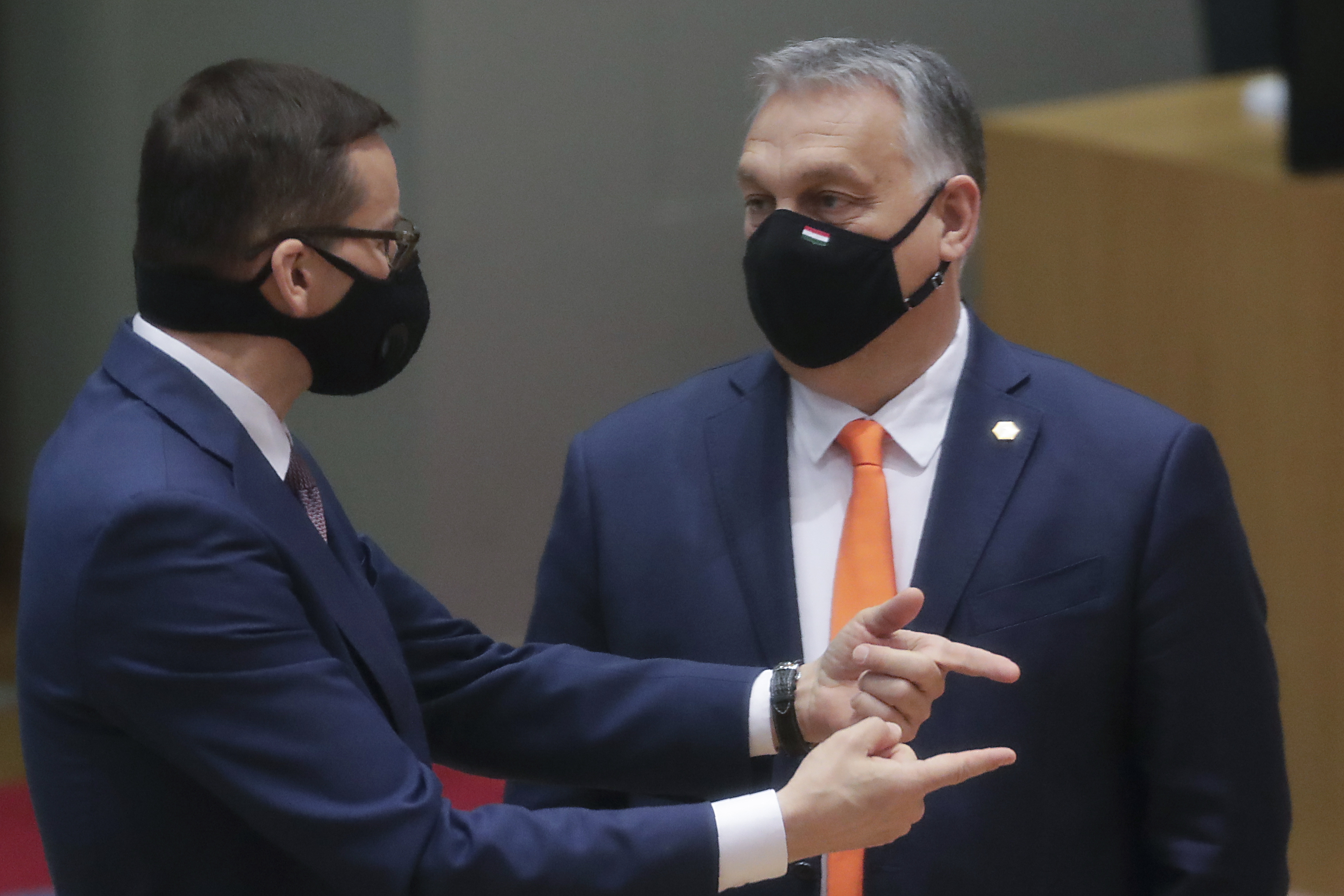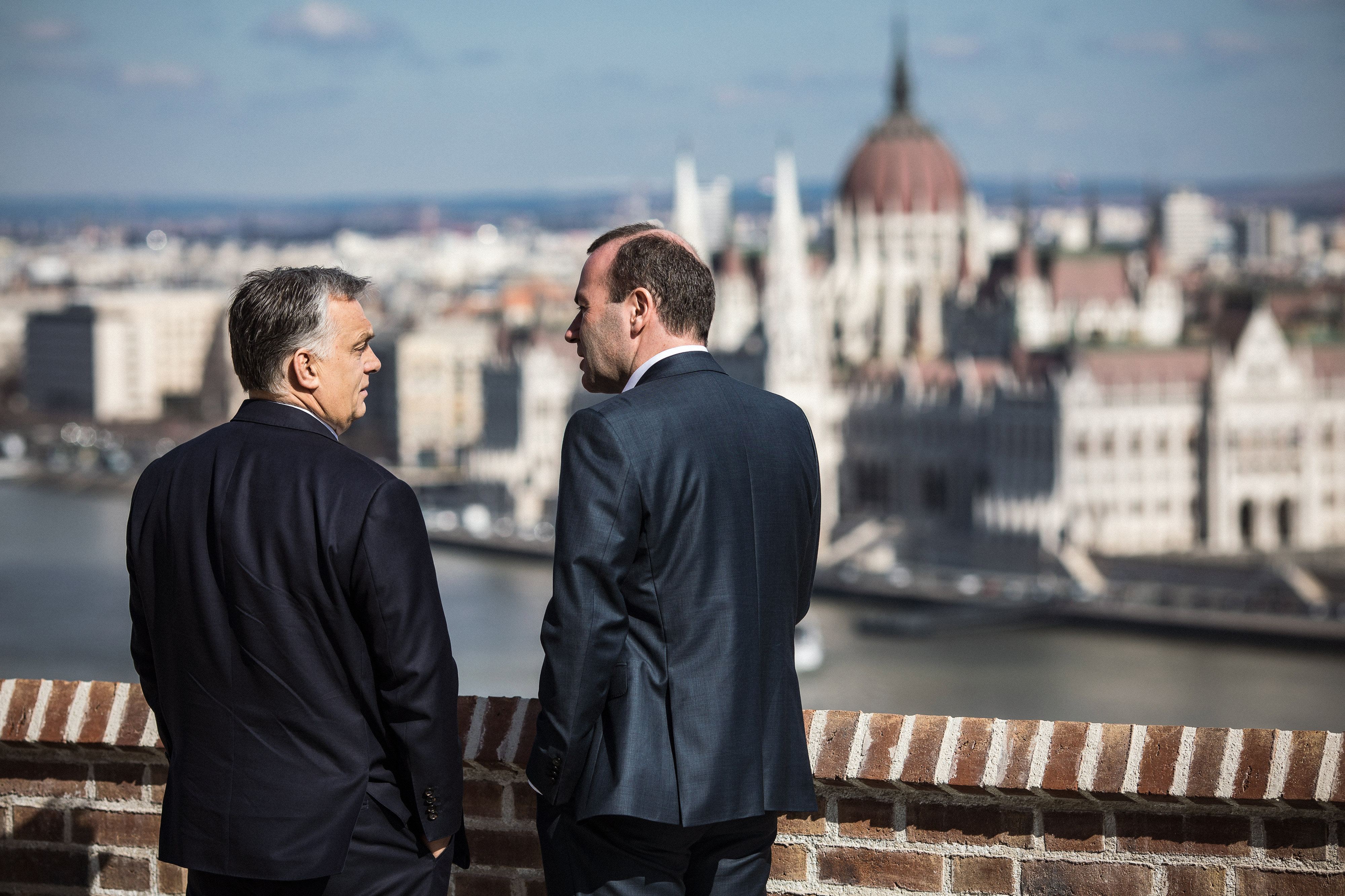Orbán predicts "victory of common sense" ahead of EU summit amid hopes of solution to budget impasse
- Stay updated on the latest news from Hungary by signing up for the free InsightHungary newsletter:
Hungary and Poland look set to drop their veto of the European Union's €1.8 trillion budget and economic recovery package after a compromise plan discussed by EU ambassadors in Brussels was leaked Wednesday.
The compromise, expected to be approved by a summit of EU leaders beginning on Thursday, would defer implementation of the so-called rule of law mechanism, which would allow for EU funds to be withheld from countries that do not comply with the bloc's democratic standards.
Hungary and Poland have fiercely opposed the conditions, arguing they would be used as an ideological tool to punish countries that reject immigration. On Tuesday, Orbán flew to Warsaw to hold discussions over the compromise with his Polish counterpart Mateusz Morawiecki and leader of the Law and Justice Party Jarosław Kaczyński.
The compromise plan was negotiated by the German presidency of the Council of the European Union, and is meant to break the deadlock by stipulating that the rule of law mechanism may not be implemented until the European Court of Justice has issued a ruling on its legality, a process that could potentially take years. The compromise also states that the mechanism may only apply to the 2021-2027 budget and coronavirus recovery package, and may not be enforced on funds allocated from the current budget period.
Additionally, the European Commission may only refer to the results of its own investigations when assessing breaches of rule of law standards, and may not rely on reports or findings by external organizations, a victory for Hungary's government which has alleged it is the victim of slander by organizations controlled by George Soros.
The plan is expected to achieve wide support at the summit, including among member states that have been firm in their commitment to rule of law conditionality in the allocation of EU funds.
The Hungarian and Polish governments have portrayed the proposed compromise as a victory: the rule of law mechanism may be triggered only in order to protect EU funds from fraud and corruption, and may not be used in response to countries' immigration or family affairs policies.
Justice Minister Judit Varga celebrated the compromise plan on Twitter Wednesday, writing, "Victory! We succeeded in separating ideological expectations from financial aid during a pandemic [and] prevented political blackmail....Yet another triumph for the HU-PL friendship!"
Still, while the two vetoing countries insisted that any rule of law conditionality on EU funds was unacceptable, the mechanism will remain in place and may be used to sanction Hungary and Poland in coming years.
Additionally, while Orbán and Morawiecki are likely to portray additional language that prohibits use of the mechanism to interfere in immigration and family policy, it never contained language that could have been used to do so, suggesting that Hungary and Poland's insistence was meant as a gambit used to portray the compromise as a concession and a victory.
Ahead of the summit on Thursday, Orbán said in a video that Hungary and Poland were "just one inch from reaching a consensus."
"Today we are fighting for the unity of our common continent...and for the victory of common sense," Orbán said.
Orbán pitches "looser" relationship between Fidesz and EPP
In a letter to leader of the European People's Party (EPP) Manfred Weber on Sunday, Prime Minister Viktor Orbán proposed a looser relationship between Fidesz and the EPP's caucus in the European Parliament, leading to speculation that Hungary's ruling party may be preparing a departure from the conservative group.
The letter - written on the prime minister's letterhead and stamped with a government stamp despite dealing with party business - declared that "emotional reactions have taken over responsible dialogue" between the EPP and Fidesz, and proposed setting up a new framework between the parties that would allow for Fidesz MEPs to remain in the EPP Group but conduct looser cooperation.
As a possible model for the new relationship, Orbán pointed to the articulation of the former EPP-ED group which included the UK Conservative Party before it left the EPP in 2009 to form its own right-wing group. Such an arrangement would entail a Fidesz departure from the EPP to form its own European Parliament group in alliance with the EPP, as the Conservative Party did with its group, the European Democrats, between 1999-2009.
The letter could be a sign that Fidesz's strained relationship with the EPP has been pushed to the breaking point by recent events. Following Fidesz MEP József Szájer's resignation from the European Parliament after he was apprehended by police attempting to escape an illegal Brussels sex party with narcotics in his possession, EPP president Donald Tusk indicated on Twitter that Fidesz "simply don't fit in with our family". Additionally, more than 30 EPP MEPs from 12 countries have demanded the expulsion of Fidesz MEP Tamás Deutsch from the party group for comments he made comparing Weber to the gestapo and Hungary's communist-era secret police.
Many within the EPP have also opposed Hungary and Poland's veto of the European Union's €1.8 trillion seven-year budget and pandemic relief package, and expressed their increasing frustration with Fidesz's conduct. Weber called the veto "irresponsible," and told a Belgian newspaper that were it not for the coronavirus pandemic, the EPP would have already voted Fidesz out of the party family.
Fidesz was suspended from the EPP in March 2019 over violations of the party family's democratic values.
Government's vaccine registration page raises data privacy concerns
A coronavirus vaccine registration website launched by the government Tuesday forwards users' personal data to a government ministry, but may not be useful in providing access to a vaccine.
In an interview on November 27, Prime Minister Viktor Orbán announced that those registering on the site "will become among the first to gain access to a vaccine," and also indicated that the registration process would be used to determine the level of demand for the voluntary inoculation.
But in an interview last week, Orbán emphasized that access to a vaccine will not be determined by the order in which users register on the government's site. It remains unclear whether registration will be a condition for receiving a vaccine, and Orbán's statements that registration will be used to gauge how many doses will need to be procured appears to contradict previous government claims that as many doses as possible are being secured from numerous sources.
The registration site requires users to provide their personal data and consent to that data being forwarded to the Cabinet Office of the Prime Minister, headed by the so-called propaganda minister Antal Rogán. Users who opt to "remain in contact" in order to continue receiving vaccine-related information will have their data managed by that same cabinet office, and forwarded for indefinite storage to Idomsoft, a state-owned company that has managed Hungary's elections system software since 2010.
Two heads of Idomsoft previously played a role in Fidesz's 2010 election campaign and are closely connected to the party's leadership.
After initially providing contradictory information, the Emergency Task Force announced on Tuesday that Hungarians will be able to choose which vaccine they prefer to be inoculated with once the drugs have been approved for use by authorities. This could be of key importance as Hungary has thus far begun assessing only the Russian vaccine Sputnik V, while opinion polls show only around 7 percent of Hungarians would be willing to take a Russian vaccine.
Lockdown restrictions extended until January 11
Pandemic containment measures, including a nighttime curfew and business closures after 7 p.m., will remain in force for another month after strict lockdown restrictions implemented in November failed to produce significant improvements in Hungary's fight against the coronavirus pandemic.
In a Facebook video on Monday, Prime Minister Viktor Orbán announced that restrictions would remain in place until January 11, and that the government would decide on December 21 whether an exception to the curfew regulation would be granted for Christmas Eve. An exception for New Year's Eve will not be made, Orbán said.
"I think a good party is not worth risking everything that we have spent months working together for," Orbán said, and emphasized that the government's epidemiological experts had uniformly recommended the extension of restrictive measures.
The first month of lockdown restrictions introduced on November 11 have shown little effect on Hungary's official pandemic data. On Saturday, 193 deaths were recorded by the Emergency Task Force, the highest daily total since the beginning of the pandemic. As of Thursday, the seven-day average of coronavirus deaths was 161.
The effects of lockdown restrictions would be expected to first appear in a decrease in new daily cases and the number of hospitalized patients. While the seven-day average of new cases has shown a downward trend in recent days, the number of those hospitalized set a record Tuesday with 8,045, and the number of patients being treated on ventilators set a record on Monday with 674.
Last week, more people died of Covid-19 in Hungary than in September and October combined.
According to data from the Central Statistical Office (KSH), more Hungarians died between November 9-15 than in any other week in the past five years. During that week, 1,244 more people died than the average for the previous five years, a 52 percent increase.
However, the surplus in deaths registered by the KSH significantly exceeds the number of coronavirus-related deaths registered by the Emergency Task Force: while 1,244 more deaths than average were reported that week, only 697 were attributed to Covid-19 by the task force.



